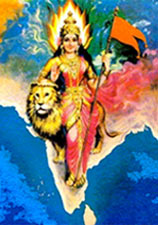Spiritual Life of the Householder
A firm development of household life) with values and virtues, is needed today in a big way.
Most people are grhasthas; only a few are sannryasins.
In the modern age, Sri Ramakrishna, Holy Mother Sarada Devi, and Swami Vivekananda have shown the householders their true place in life and enhanced their prestige. Sri Ramakrishna himself was a grhastha .. Sri Sarada Devi was a householder. Both of them enhanced the glory of the institution of the grhastha.
Till recently, our grhasthas were underestimating themselves. It is for this reason that incarnations arrive to give grhasthas selfconfidence, prestige, and strength. Even the incarnations are born in grhastha families. The entire world, the entire _society, depends upon the grhastha.
Constricted Life
We must realise that a grhastha is one who lives in a grha or home. But he has the freedom to be inside or outside the home. Without this freedom, a home would become a prison. A home is not a prison, it's a household. In our country, the householder's life had become something like a prisoner's life. Our minds never went beyond life in the household. We remained constricted within a small circle. We lost the feeling of vastness. Our minds became narrow. We were concerned with only 'I and mine'. Sri Ramakrishna says, Get rid of 'I and mine.'
Greatest Asrama
A verse in the Manu Smrti suggests the greatness of a Grhastha:
'The grhastha asrama is the greatest among the asramas, because it is only the grhastha who provides food and education to the people of the other three asramas,
A grhastha does so much work and yet underestimates himself! He should be proud of his contribution to society. Society runs on the strength of a grhastha. So the grhnstha asrama is the greatest of the four asramas.
What Manu has said above appears before us in a new language today. I am referring to the modern concept of citizenship. A citizen is not concerned only with his or her own home. He or she thinks of the progress of the entire country.
National Responsibility
 |
There are two values in citizenship. One is freedom. A man or woman is free; a citizen is free. The second is responsibility. There must be the awareness of social responsibility along with freedom. A citizen should have a sense of national responsibility. It is only when these two values--freedom and responsibility--come together that an individual becomes a citizen, a tue grhastha.
To be a true grhastha, it is necessary to have self-confidence and self-reliance. The people of our country had lost these. They knew only. how to devalue themselves by saying, 'I am only a grhastha, I am only a samsari, mine is only a weak human existence.'
Casting aside this feeling, making the mind broader, and taking the responsibility for the progress of our country--this is what we have not done. And so, during the last 800 years of our history, others created history and we became only victims of that history.
There must be some fault either in our philosophy or in our pattern of life. That is why such a thing had happened; and we shall work hard to raise all our people.
Need for Collective Work
The people of India will be uplifted only when they are filled with courage and Atma-sraddha, faith in themselves, and love for the country and its people.
Even a few of us cannot work together. No great work can be done by one individual alone.We have to learn to work together and achieve results. To work together, strength of character is necessary.This is precisely what we are lacking today. Everyone is full of egoism. You have no place in my thoughts,nor do I have a place in yours.

